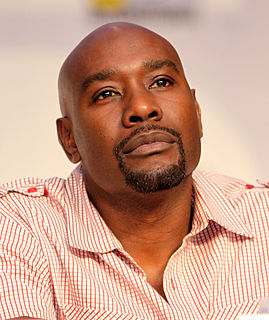A Quote by John Cleese
Nerves are always a big problem for me, which is why I loved doing American sitcoms. Because you know when you do the take in front of the audience that you're going to do it again afterwards. A minute after you finish, you just go and do it again. So, there's that sort of safety net. And then if you made a little mistake or two, they'll go pick it up, so there's nothing to worry about.
Related Quotes
Performance is made in the editing room, and I've come to see the truth in that - the idea that they say performances are usually made in the editing room because what you film is the raw material. I think just going through the process of saying, "Which take do we use? Why is that the take we want? I want that take can you edit again, I'm not sure that's the one, I think it's this one." And just because you go through that process, I think somehow it's made me sort of more open about the [actor's] possibilities.
I think after a big European game you're looking at four or five days. For two days afterwards I don't really do anything. I do a recovery the next day, which is bike work, a light stretch, some yoga and an ice bath after that. Then the second day I would just do the bike again for 20 minutes and then do some strides, which is box to box, just eight of them, just to get the legs going and the blood going again.
When I get to 40, I'm going to re-evaluate everything and then go from there. Because when I get to 40, I would like to see where I'm at in my career because I might want to go, 'You know what, I'm done. I'm just happy with everything,' and I'm going to go off my merry way, and I'll probably never pick up a golf club ever again.
I was wholly at peace, at ease and at rest, so that there was nothing upon earth which could have afflicted me. This lasted for a time, and then I was changed ... I felt there was no ease or comfort for me except faith, hope and love, and truly I felt very little of this. And then presently God gave me again comfort and rest for my soul ... And then again I felt the pain, and then afterwards the delight and joy, now the one and now the other, again and again, I suppose about twenty times.
When I look at the directors that I really love, who really develop their films over time, they're almost always the ones who go back again and again and again at the same investigations. I think that when somebody has a theme they go after, it's fun to service that. It's like, "I know you now. I know what you go at." It helps you locate yourself a little bit quicker in their world.
Again and Again, however, we know the language of love, and the little churchyard with its lamenting names and the staggeringly secret abyss in which others find their end: again and again the two of us go out under the ancient trees, make our bed again and again between the flowers, face to face with the skies
These are two different exercises. One of them is, "You don't know and I know, so just shut up and listen," and the other one is, you're curious and you're learning, and I have a way where you can learn this so you'll know it as well. And when you know it, and know why you know it, then you don't have to reference me ever again because you take ownership of the knowledge, and you can then share it with someone else.
For me it's really tough because you have to go to that place where you really, really don't want to go to or revisit. After the first movie, when I was crying at the altar, whenever I would think about it, I would get chills for months after the first "Best Man" because I had to go to that place. And then, here we are with this one, and we are going to that place again. It's just extremely emotional to just have to keep revisiting it, but it can also be therapeutic.
If we're lucky, writer and reader alike, we'll finish the last line or two of a short story and then just sit for a minute, quietly. Ideally, we'll ponder what we've just written or read; maybe our hearts or intellects will have been moved off the peg just a little from where they were before. Our body temperature will have gone up, or down, by a degree. Then, breathing evenly and steadily once more, we'll collect ourselves, writers and readers alike, get up, "created of warm blood and nerves" as a Chekhov character puts it, and go on to the next thing: Life. Always life.




































